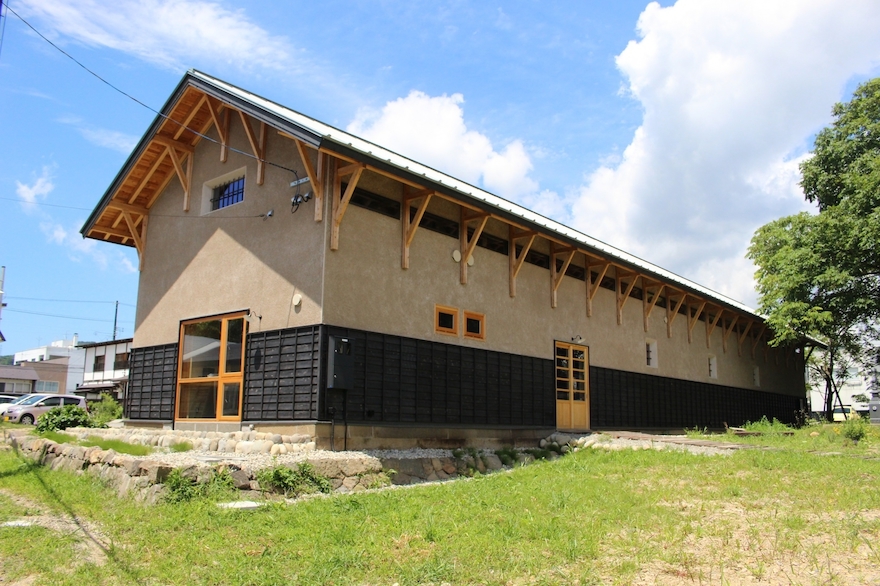
Project Name: Hajimari Art Center
Location: Inawashiro, Japan
Date Designed: 2013
Date Completed: 2014
Size: 1,217.14 sqm (Site area), 235.66 sqm (Building area), 284.01 sqm (Total floor area)
Client: Asaka Hospital Group
Programme: Culture
ABOUT studio-L
Studio L is a Japanese firm that focues on community design. As community designers, the firm focuses on empowering the local people to participate in problem solving in their neighbourhoods. A typical workflow of a project consists of researching on case studies, conducting interviews and workshops as well as connecting different people in the local community to be involved in the project. Studio L was founded by Ryo Yamazaki together with Takanori Daigo, Shinji Kanba and Arisa Nishigami in 2005 (previously known as Seikatsu Studio). Its early years saw the team working on projects such as the renewal of a magazine delivered from a park management organisation in Osaka and the Senri Rehabilitation Hospital Project which helped Ryo Yamazaki to recognise a new role of a community designer.
ABOUT Hajimari Art Center
Hajimari Art Center is a small museum, established by renovating a 130-years sake brewery. It aims to provide opportunities to develop a tolerant and creative society by encouraging art expression and connection among people.

Hajimari Art Center
Interview with Noriko DENO, Hwana HONG, and Sayaka HIRANO of studio-L
Insights and Takeaways
1. ADVICE TO YOUNG ARCHITECTS?
Deno San: I do not have a background in architecture or landscape architecture, but I think getting the local residents involved in the design process is very important. It is important to think about how people would use the building after it is open instead of focusing on creating a lovely nice building. In my opinion, incorporating the locals’ opinions as well as local culture in the design is very important.
We work with architects as well. The workshops are conducted prior to the design such that they could reflect the opinions and the culture of the locals and provide insights to how people might use the building. These would be incorporated into the design by the architects.
Hong San: I think workshops are also a good time for residents to think about their lives, how they would like to live in their city. It gives them the opportunity to design their lives in the future.
Deno San: Workshops provide the opportunity for people to think about their lives and learn about their surroundings. People are not necessarily aware about the things happening around them. People living in Tokyo might not know about their neighbours but people living in small towns might know almost everything. This kind of information is very important for local residents so that they know where to seek help or know who to help, especially in the context of natural disasters.
Workshops essentially help residents learn about their surrounding and spark them to think about what they want to do in their lives, what they need and what the neighbourhood needs. It is important to design this into the workshops such that people can talk not only about the upcoming building but also share their lives. All these insights would inform a better design of the building and its landscape.
The role of studio-L sometimes is to look after the management of the built environment. There was this park that was designed and built 10 years ago but there was the shortage of park visitors. The park management approached studio-L to explore how they could increase the park usage among residents. So, It is very important to think about how the building is going to be used after its built.
2. HOW DOES COVID AFFECT YOUR WORK?
Hong San: In Japan there was no constitutional law to prevent people going out. However, the government did request us to stay at home. So, most people stay at home and staying at home for too long causes stress, especially to families raising children. I heard in the Tachikawa Children Future Center, coordinators have been coordinating different community groups to reach out and help affected people in the community. The community groups help disseminate important information as well as conduct activities such as sharing sessions where people could come and share their experiences so as to not keep their stress bottled in. Community support is also available to residents who need it.
Deno San: The nature of community design is to be able to interact with each other face to face. With COVID-19, it is hard and we have been trying all sorts of online methods to figure out which one works the best. I think it is important to make people feel that they are connected to each other somehow. In the past workshops used to be designed to last 2 to 3 hours. However, it is very tiring to sit in front of a screen for that duration. With online workshops it is cut down to approximately 90 mins. There is also a time allocated in the workshops for the participants to talk about anything or share their life which need not be related to the project or the theme of the workshop. I think talking to people really helps. It is also important to schedule meetings in advance and set a date for next meeting.